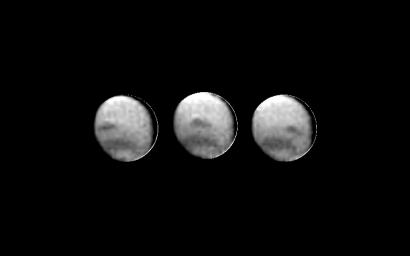3 Images of Neptune
Caption:
These three images of Neptune were acquired 90 minutes apart by the Voyager 2 spacecraft on April 3, 1989, from a range of 208 million kilometers (129 million miles). Several atmospheric features (clouds) are visible. In addition to the dark band encircling the south polar region, a large dark spot extends from latitude 20 S. to 30 S. and spans 35 degrees in longitude. It rotates with a period between 17 and 18 hours. Relative to the size of the planet, the spot's dimensions are similar to those of the Great Red Spot of Jupiter. These images were taken exclusively through the clear filter of the narrow angle camera, which is most sensitive to blue light. The spot is 10 percent darker than its surroundings. Resolution of the images is about 3850 kilometers (2400 miles) per line pair. Images taken 70 days earlier show either the same spot or a similar spot, which appears darker than its surroundings through the clear filter but brighter through the orange filter. Clouds visible in the orange images are thought to be at higher altitudes than those visible here, and may have different scattering properties at the two wavelengths. The Voyager cameras will be tracking these atmospheric features during the next three months in order to target them for close-up imaging in the days before the spacecraft's closest approach to Neptune on August 24, 1989.
Background Info:
The Jet Propulsion Laboratory manages the Voyager Project for NASA's Office of Space Science and Applications.
Cataloging Keywords:
| Name |
Value |
Additional Values |
| Target |
Neptune |
Jupiter |
| System |
|
|
| Target Type |
Planet |
|
| Mission |
Voyager |
|
| Instrument Host |
Cassini Orbiter |
Voyager 2 |
| Host Type |
Orbiter |
Flyby Spacecraft |
| Instrument |
Imaging Science Subsystem (ISS) |
|
| Detector |
Narrow Angle Camera |
|
| Extra Keywords |
Atmosphere, Grayscale, Rotation, Storm, Visual |
| Acquisition Date |
|
| Release Date |
1999-10-14 |
| Date in Caption |
1989-04-03 |
1989-08-24 |
| Image Credit |
NASA/JPL |
| Source |
photojournal.jpl.nasa.gov/catalog/PIA01363 |
| Identifier |
PIA01363 |

 Planetary Data System
Planetary Data System
